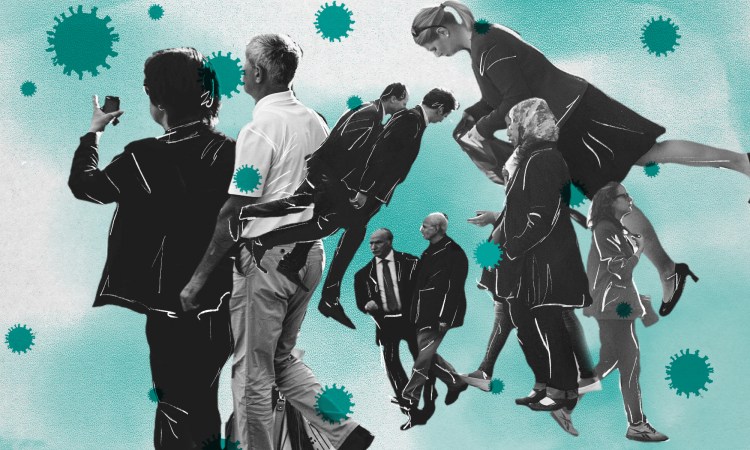
Welcome to “Dear Guy,” TED’s advice column from NYC psychologist Guy Winch. Twice a month, he’ll answer your questions about life — about your relationships, your job (or jobs), your family (or families), your passions, fears and more. Please send your questions to dearguy@ted.com; to read his previous columns, go here.
Dear Guy:
I’m incredibly anxious about coronavirus and what’s going to happen to me, my loved ones, my coworkers, my neighbors, community, and everyone else. What can I do? How do I deal with this?
Signed, The world
Editor’s note: While this letter isn’t real, the feelings in it are. We’re publishing this special edition of “Dear Guy” to address a topic on many people’s minds right now.
Dear World:
Two weeks ago, the majority of my patients spent at least part of their sessions discussing anxieties about the coronavirus. Last week, every single one of them did. And they expressed many of the same worries: “Will I get it? Should I avoid seeing my elderly relatives? Where can I find some toilet paper?”
Indeed, the pandemic is fueling fear and anxiety around the world. But even though they elicit a similar psychological response, fear and anxiety are two different things. Fear is a response to a specific and imminent danger; anxiety is a response to a vague and future threat.
Most of our emotional responses to coronavirus are in the anxiety category. For the vast majority of us, the threat is still uncertain, like a storm cloud of “what if”s hanging over our heads. We don’t know if we’ll be exposed to the virus or not; if we are exposed, we don’t know if we’ll get symptoms or not; and if we do get symptoms, we don’t know if we’ll able to recover from them.
And unfortunately, anxiety feeds on “what if”s and uncertainty. It fills any unknowns with terrifying worst-case scenarios that keep us in a state of constant stress. Anxiety is, by definition, a psychological over-reaction that can make the most uncertain, unlikely and potentially manageable threats seem both incredibly certain and absolutely unmanageable.
Another problem with anxiety is that it makes us feel helpless, powerless, overwhelmed and paralyzed — all of which increase our feelings of vulnerability and make us less likely to take action.
But that’s where the key to managing our anxiety lies: in taking action.
By acting to restore the very feelings that anxiety seeks to diminish — feelings like control, empowerment, reason and agency — we can shut off our fight-or-flight response, regain a more realistic assessment of the actual threat, and use our emotional and intellectual capacities to deal with it more effectively.
That said, we are living through unprecedented and extremely challenging circumstances. All of us will experience moments of anxiety, panic, anger and other forms of distress. If you’re overwhelmed by such feelings, do not blame yourself for having them — they’re entirely appropriate. However, do consider adopting emotional self-care strategies (such as the ones below) to help reduce their frequency and intensity.
I’m sure that most of you know the basics about what you should be doing now to maintain your physical health: Get accurate updates and information from reputable sources such as the World Health Organization and the US Centers for Disease Control, frequently use hand sanitizer or wash your hands for at least 20 seconds with soap and water, seek medical attention if you develop any symptoms, etc.
But you also need to take care of your emotional health. One important way to do that is to manage your anxiety and to reduce your stress. Here’s how I’m managing my own coronanxiety and how you can manage yours.
1. Focus on what you do know as opposed to what you don’t know
Whenever you notice that your anxiety is leading you to contemplate “what-if” scenarios straight out of World War Z, resist taking the bait. Instead, focus on the facts. For example, while you don’t know if you’ll get the virus, you do know that the majority of people who get COVID-19 have symptoms that are minor and manageable. Or, you don’t know when the crisis will be over, but you do know there is unprecedented global cooperation going on among scientists who are racing to find vaccines and treatments. Or, you don’t know when you’ll see beloved family members who are living in other countries, but you do know you can video-chat with them and stay connected.
2. Focus on what’s in your control as opposed what isn’t
When you feel overwhelmed by what’s going on, take a pause from whatever you’re doing, and shift your mind to thinking about what’s within your control. For example, if you’re in the supermarket, you can’t control whether the other shoppers have washed their hands, but you can put on gloves or use your elbow to open doors and clean your hands thoroughly as soon as you get home. If you’ve been asked to work from home, you can’t control when you’ll be allowed to return to the office but you can make a list of tasks that you can accomplish from home, like emptying out the junk drawer, cancelling the gym membership you don’t use, researching a cheaper cell phone plan to switch to, or tackling that mountain of magazines that your partner has been asking you about.
3. Focus on what you can do as opposed to what you can’t
Whenever you feel powerless, focus on the actions you can take instead of those you cannot. If you plan in a community basketball team and practices and games have been cancelled, you can still work on your skills by using visualization which studies have found, may be almost as beneficial as actual practice. If you’re a parent and you’re worried about your children feeling stressed and anxious, it’s especially important to help them focus on what they can do as opposed to what they cannot. You know one thing all kids can and should do? Chores. Chores are good in times of stress because they allow you and your kids to take action and by doing so, counter your feelings of helplessness and powerlessness. Do your chores together whenever possible — for example, prepare a meal, wash the dog, start a vegetable or flower gardens — since this can enhance bonding at a time when feeling close and connected is so important.
4. Help yourself by helping others
Whenever you feel paralyzed by difficult feelings, one way to get unstuck is to help other people who are in need. In fact, kindness, altruisma and doing for others significantly improves our own well-being than doing for ourselves. Check on a neighbor who lives alone, text a friend who works in a business that’s been hit hard by the pandemic, or call an elderly family member to say hello. If any of your friends or family are struggling with feelings of anxiety, communicate what you’ve learned about managing your own worries. Practicing kindness and helping others are great ways to reinforce your own feelings of agency and control, and they have the bonus of making you feel empowered and connected — important feelings that we could all use more of during these times of stress and potential social isolation.
5. Limit your news consumption
The situation is changing and developing by the hour which is keeping many of us glued to the news or to social media. However, when the news is especially stressful, it’s extremely important to find a balance between keeping informed and not becoming overwhelmed. Decide on specific times of day in which you will check the news, and check it only then. In between, try to focus on doing normal life activities as much as possible, especially if you are sequestered at home or if you have children. We need to give our minds and bodies as many opportunities as possible to de-stress and recover, which means taking breaks from all stress-inducing activities such as news consumption or conversations about the news.
6. Keep your perspective
Right now it can be hard for any of us — psychologists included! — to see the light at the end of the tunnel. But this emergency situation will resolve eventually. We don’t know if it will be in weeks or in months, but humans are highly adaptable creatures and life will seem normal again soon (although it might be a “new” normal).
World, we’re definitely being challenged right now. But we’re far from helpless. We can take control; we can take steps to actively manage our emotional health when we’re stressed or distressed; and we can communicate with our loved ones and stay connected to them. And once we do, we’ll emerge from this crisis having gained something of a great value, something that only true challenges can bestow — increased resilience, understanding and empathy.
Guy
Send your pressing questions about life — about your relationships, your job (or jobs), your family (or families), your passions, fears and more — to dearguy@ted.com
Watch his TED Talk on emotional first aid now:














